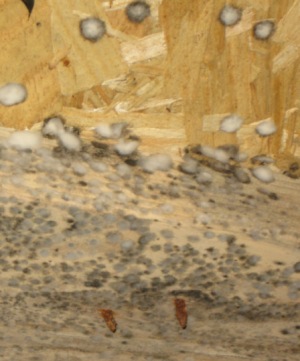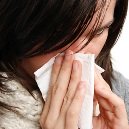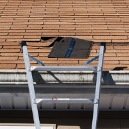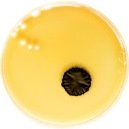Find a pre-screened local mold removal specialist Free Estimate
Find a Mold Specialist Now
Click or Call, Toll-Free 24/7
Asthma Due To Mold Exposure
Molds have the potential to cause numerous health issues, including asthma due to mold exposure. Asthma is considered to be a long-term disease of the lungs. It is sometimes referred to as chronic respiratory disease and may be easily mistaken for COPD, chronic obstructive pulmonary disease, as the two have similar symptoms. The age at which the disease is diagnosed is the difference between asthma and COPD. Asthma is usually diagnosed in children, where COPD symptoms usually don’t show up until a person is 40 years old or older.
There is some disagreement among health care professionals about whether or not exposure to mold can actually cause asthma, but there is definitely a link between mold and asthma. The exposure to mold in your home can make asthma worse in people previously diagnosed with the condition and it can cause asthma-like symptoms in people that did not previously have the condition. This is because certain types of molds produce allergens. Alternaria, cladosporium, and aspergillius are common types of mold that are known to produce allergens that affect humans. These allergens can cause allergic reactions in sensitive individuals. The allergic reactions are usually a result of the body’s misidentification of the mold spores. Once your body makes a mistake of this kind it will continue to make the same mistake every time it encounters that particular mold allergen.
Just because you are sensitive to one type of mold doesn’t mean that all molds will cause you the same type of allergic reaction. The symptoms of asthma due to mold exposure can be immediate or develop over time. An increased intensity of asthma attacks in people sensitive to mold may be an indicator of the presence of mold in their environment.
Symptoms of Mold-Related Asthma
If you were previously diagnosed with asthma, there is an increased chance that exposure to mold may make your symptoms worse. You may begin having asthma attacks more often, these attacks may last longer, and they may seem more severe. If you are considered sensitive and you breathe in mold spores, your immune system kicks in as usual, but then over reacts. One sign of this over-reaction could be a restriction of your breathing. Due to your increased mold exposure, medications that previously helped may not seem to work as well as they used to.
If you were never diagnosed with asthma before, prolonged exposure to mold in the home may cause you to develop asthma-like symptoms. Your chest may feel tight, you may have difficulty getting enough air, and you may begin to wheeze loudly.
See your doctor right away or go to the nearest emergency room if you have trouble breathing, if you’re experiencing symptoms of asthma when you haven’t had such symptoms before, if your asthma seems to be getting worse, or if medications that used to work do not seem to be helping anymore. Let your doctor know if you may have been recently exposed to mold or if you think your symptoms might be mold-related.
Treatment For Asthma Due to Mold
Treatment for asthma due to mold exposure is similar to the treatment for any other kind of asthma and symptoms can usually be managed with proper treatment. Treatment may include medications taken regularly to prevent symptoms, like inhaled corticosteroids (such as beclomethasone, budesonide, ciclesonide, fluticasone and mometasone) and long-acting beta agonists (such as salmeterol and formoterol), as well as medications taken on an as-needed basis when symptoms flare up, like short-acting beta agonists (such as albuterol and levalbuterol). While these medications can make breathing much easier, they can also have unwanted side effects such as tremors, sweating, and insomnia. Always be sure to discuss the risks and benefits of any type of asthma medications with your doctor.
 Mold in unfinished basement
Mold in unfinished basementIn order to reduce or eliminate symptoms of asthma due to mold exposure, it will be necessary for you to avoid further exposure to mold as much as possible. In fact, continued exposure to mold may cause these symptoms to get worse and asthma attacks to increase in both frequency and severity. If your symptoms are severe, your doctor may recommend that you not return home until the mold has been removed from your home. Ask your doctor about the link between mold and asthma symptoms and what you can do to best manage and reduce your symptoms.
Since asthma due to mold exposure or asthma-like symptoms will likely just get worse without treatment, we encourage you not to delay seeking medical treatment. Any mold discovered in your home needs to be remediated as soon as possible. Asthma can become quite serious and can cause permanent damage to the bronchial tubes (called airway remodeling) as a result of uncontrolled asthma. This may cause lifelong breathing problems. (Note that other health problems can also result from exposure to household mold, which can further complicate matters). Getting prompt medical treatment can prevent the occurrence of additional lifelong health issues.
For Help With Mold Removal
If you think you are experiencing symptoms of asthma due to mold exposure, you should not attempt to clean up the mold yourself. The cleanup process stirs up mold spores, which causes them to become airborne. This increases your risk of exposure and can make your symptoms significantly worse. The last place you should be if you have asthma due to mold exposure is in the middle of a mold remediation project. That is why it is sometimes appropriate for you to vacate your home.
Contact a certified mold removal professional to inspect your home, to develop a remediation plan, and to provide a solution to your mold problem. A trained professional will know how to do the job safely and will have all the equipment needed to make sure that the mold is completely eliminated, and that no mold spores are allowed to spread to other areas of the home during the cleanup process. Click on this link to find qualified mold removal professionals near your home that can provide a free inspection and a no-obligation estimate for the mold’s removal.
Return From Asthma Due To Mold To Our Main Mold Symptoms Page
EPA: Asthma Triggers
Free Home Inspection By A Mold Removal Specialist
Search This Website

Recent Articles
-
See Our 5 Recommended Mold Removal Companies in Covington, KY
Apr 16, 25 12:59 PM
-
See Our 5 Recommended Mold Removal Companies in Wheaton, IL
Jun 20, 24 10:33 AM
-
See Our 5 Recommended Mold Removal Companies in Aberdeen, SD
Oct 08, 21 04:05 PM




